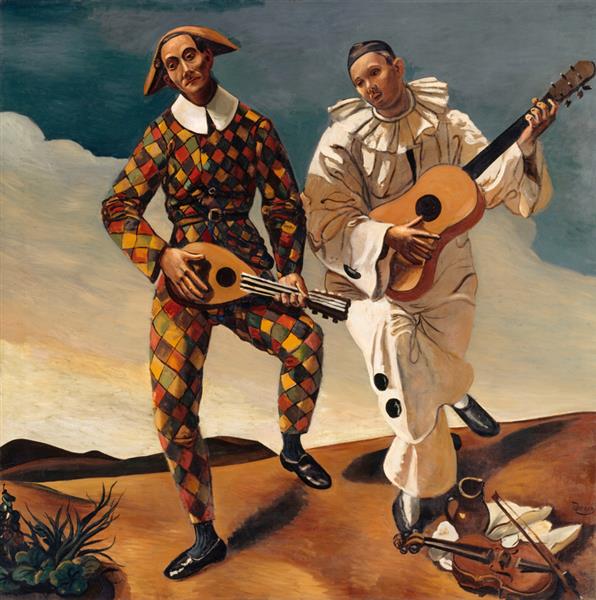Description
André Derain's "Arlequín y Pierrot" and its emotional approach towards visual representation. In this painting, Derain captures the essence of two iconic figures of the art comedy, the harlequin and the Pierrot, which have been interpreted and reinterpreted throughout the history of art and theater.
The composition of the work is a rich mixture of vibrant colors and simplified shapes, where the two figures clearly stand out. The harlequin appears with its characteristic colored rhombus suit, which are intertwined in an almost festive deployment, and the Pierrot, with its white outfit, presents a melancholic expression that contrasts with the joy that the harlequin suggests. This contrast between the vivacity of the harlequin and the sadness of Pierrot creates a narrative tension that invites the viewer to reflect on the duality of life and human feelings; A recurring theme in Derain's work and in the representation of these characters.
As for the use of color, Derain uses an intense palette that, together with its loose brushstroke technique, infuses painting a palpable energy. Each tone seems to speak and vibrate in harmony with others; Blue and yellow are intertwined with black and white to build an energetic, but also nostalgic atmosphere, reflecting the internal conflict of the characters. This use of color is not only aesthetically attractive, but also adds a layer of emotional meaning, a distinctive seal of Fauvism that Derain helped establish.
The work is not only limited to the representation of these characters, but also enters the symbolic use of their iconography. Harlequin and Pierrot have traditionally been associated with the dual nature of entertainment art: joy in the face of sadness, the comic in front of the tragic. The way in which Derain presents them in this work encapsulates this polarity, making it a mirror of the human condition.
Beyond his characters, "Arlequín and Pierrot" also reflects the influence of Cubism and abstraction in Derain's work, although he moves away from the rigidity that characterizes those styles. The forms are simplified, with a certain geometry that suggests a fresh modernity, but they also retain a sense of dynamism and fluency inherent in the Fauvista painting. This approach allows the viewer to explore the surface of the work through its colors and shapes, a type of visual interaction that invites a deeper experience.
Derain's work in "Arlequín and Pierrot" is not only limited to a particular moment in his career, but also represents a confluence of cultural, aesthetic and emotional influences. In the context of the 1920s, a period deeply marked by the search for new forms of expression after the First World War, the work is presented as a dialogue between tradition and innovation, contributing a contemporary look to characters that have endured the long time. Thus, this painting is not only a testimony of Derain's technical domain, but also a reflection on the emotional and cultural framework that defines the human being. In short, "Arlequín and Pierrot" is an invitation to immerse yourself in the game between art, life and complexities of human emotions.
KUADROS ©, a famous paint on your wall.
Reproductions of paintings handmade oil, with the quality of professional artists and the distinctive seal of KUADROS ©.
Art reproduction service with satisfaction guarantee. If you are not completely satisfied with the replica of your painting, we refund your money 100%.

